-
 Art of Wellness Acupuncture & Traditional Chinese Medicine (TCM)11704 Wilshire Blvd, Suite 295, Los Angeles, CA, 90025
Art of Wellness Acupuncture & Traditional Chinese Medicine (TCM)11704 Wilshire Blvd, Suite 295, Los Angeles, CA, 90025
myartofwellness@gmail.com310-451-5522 Office Hours
MonClosedTue7:30 am --4 pmWed7:30 am --4 pmThu7:30 am -- 4 pmFri7:30 am -- 4 pmSat7:30 am -- 4 pmSunClosedOur office opens from Tuesdays to Saturdays 7:30 am to 4 pm, will be closed on Memorial day, Independent day, Labor day, Thanksgiving day, Christmas and New year.
-
Recent Posts
- How to Treat Shin Splints With Acupuncture and TCM
- How to Treat Dysautonomia With Acupuncture and TCM
- How to Treat Myofascial Pain Syndrome With Acupuncture and TCM
- How to Treat Costochondritis With Acupuncture and TCM
- How to Treat Ankylosing Spondylitis With Acupuncture and TCM
- How to Treat Gastroparesis With Acupuncture and TCM
- How To Treat Sleep Apnea With Acupuncture and TCM
- How To Treat Baker’s Cyst With Acupuncture and TCM
- How to Treat Sinusitis With Acupuncture and TCM
- How To Treat Sjogren’s Disease With Acupuncture and TCM
- How to Treat Raynaud’s Syndrome With Acupuncture and TCM
- How to Treat Autoimmune Disorders With Acupuncture and TCM
- Sign up to receive news and updates and get my free report:“The Top 10 Reasons to Try Acupuncture”

May 2024 M T W T F S S 1 2 3 4 5 6 7 8 9 10 11 12 13 14 15 16 17 18 19 20 21 22 23 24 25 26 27 28 29 30 31
Allergies
How to Treat Candida With Acupuncture and TCM
By Xiaomei Cai, L.Ac., Ph.D., & Qineng Tan, L.Ac., Ph.D.
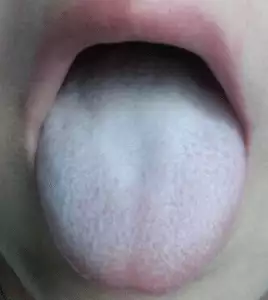
Why do I keep getting yeast infections? White patches on the tongue? It could be the common fungal infection Candida, also known as Candidiasis or a yeast infection. Candida infection can happen to people of all ages and in different parts of the body. Acupuncture and TCM Chinese herbs can help resolve recurrent yeast infections and thrush in the mouth.
Candida albicans, the species of candida fungus that most often causes candidiasis, is a type of yeast that naturally exists in the human body. When the population of candida is kept to normal levels, it causes no harm; in fact, it acts to help digestion and the absorption of nutrients from food. But when proliferation of the fungus gets out of control, candida can cause burning pain, redness and inflammation, and difficulty with normal processes like eating, digestion, and elimination. In extreme cases, candidiasis can cause serious illness.
Candida overgrowth most often happens in the mouth (known as “thrush”), or in the genital area (usually called a “yeast infection”). Thrush in babies’ mouth commonly affects very young infants, creating white or yellow patches or sores in and around the mouth that can affect feeding. Thrush in adults is less common, but can occur when someone’s immune system is weak (common among people living with HIV/AIDS), or if they wear dentures or use medications for dry mouth, causing the typical white patches, cracks in the corners of the lips, and burning sensations in and around the mouth and throat.
Most women have probably experienced a vaginal yeast infection at some point in their lives. This type of candida causes burning and itching in the vulva and vagina along with a white, clumpy discharge. Candidiasis can also affect men, causing an itchy rash on the penis.
Is candida or thrush contagious? It’s rare for a person to “catch” a fungal infection from another person, but it is possible, for example, for a person to pass a yeast infection to his or her partner through sexual contact. It is also possible for a mother to develop thrush on her nipples from nursing her baby who has oral candidiasis.
Candida overgrowth can affect other parts of the body, including the finger or toe nails (candidal paronychia), and especially areas of the skin that tend to be damp and sweaty, like the armpits or the creases around the groin.
In some cases, invasive candidiasis can get deeper into the body, infecting the gastrointestinal system or even getting into the bloodstream, which can lead to infection of various organs, including the eyes, heart or kidneys. This type of candida infection can become serious, causing fever, and even sepsis, which can be fatal.
Candida overgrowth creates different problems for different people. That is why TCM, acupuncture, and herbal medicine provide an excellent way to treat candida. TCM theory of candidiasis treatment allows for a highly individualized approach to each patient, so that we can get rid of yeast infections for good.
Top 5 Types of Candida Infection

Candida overgrowth can occur in different parts of the body. The most common kinds of yeast infection or candida are:
- Oral candidiasis – also known as thrush in mouth, or yeast infection in the mouth. Thrush in babies usually occurs because the infection passes from the mother’s vaginal area to the baby during birth, and the infant’s immune system is not developed enough to fight it. What thrush on tongue looks like: white patches that can be wiped off.
- Vaginal candidiasis – commonly known as a vaginal yeast infection, candidiasis of the female genitals causes redness, burning, and “cottage cheese-like” discharge.
- Candidal balanitis – candida infection of the male genitals happens particularly in uncircumcised men. More recent research has led some medical professionals to believe that fungal infections may cause a prostate problem, infection in prostate, prostatitis symptoms, enlarged prostate symptoms, and symptoms to prostate cancer.
- Cutaneous candidiasis – or yeast infection on skin. Candida can cause diaper rash in babies, and red, itchy, peeling patches in areas where the skin has many folds and creases. Candidiasis can also infect the fingernails, toenails and nail beds.
- Invasive candidiasis – When candida gets into the digestive tract or bloodstream, it can cause a serious systemic infection that affects the blood, heart, brain, esophagus, and/or digestive tract. This happens most often in people with compromised immune systems, especially people with HIV or who are undergoing chemotherapy for cancer.
Candida overgrowth can also lead to symptoms of fatigue, chronic allergies, chronic sinusitis or post-nasal drip. Central nerve damage, constant irritability, and chronic fatigue syndrome are all signs that a person may have a deep candida infection.
What Causes Candida?
Candida yeasts are present in every human body. What causes candidiasis is abnormal fungal overgrowth due to a lack of friendly bacteria or a weakened immune system. Women often get yeast infections during pregnancy because of changes in the balance of bacteria in their pelvic area. Antibiotics, steroids, birth control pills, and chemotherapy drugs can all contribute to candidiasis by affecting the gut flora. Just a few rounds of antibiotics can destroy all of the healthy bacteria we need to maintain proper balance. Personal habits and hygiene mishaps, like wearing too-tight pants or the same sweaty workout clothes all day, can also lead to yeast infections. Food choices can also play an important role in whether or not a person is prone to yeast infections. It may be recommended that people go on a “candida cleanse” or special candida diet to help stop the candida overgrowth.
How Do You Treat Candida?

Often a mild case of candidiasis in the mouth will go away within a few weeks on its own. If oral thrush treatment is needed, a doctor may prescribe antifungal nystatin drops, mouthwash, or lozenges.
Cutaneous candida (skin infection), vaginal yeast infections, and male genital infections will usually be treated with antifungal medications such as Fluconazole, which can be taken orally, or topical antifungal creams like Nystatin.
These antifungals may help to alleviate the symptoms of candidiasis by stopping the yeast overgrowth. However, for many people who experience recurrent yeast infections, they are only a temporary solution. Frequent use can build up an antifungal resistance. When candida keeps coming back, there is surely a deeper cause for the ongoing yeast infections.
Azoles and other types of antifungal medications are used to stop the growth of the candida in patients with invasive candidiasis. Unfortunately, they can also be toxic to other organs, like the kidneys. For people who are already in poor health, these medications may cause more harm.
Acupuncture and TCM provide a method for dealing with candidiasis while improving immune function, and revitalizing the health of the skin, reproductive organs, digestive tract, or whatever parts of the body are affected by candida overgrowth.
How Can Acupuncture Help Candida?
In TCM philosophy, the spleen and stomach play important roles in digestion, especially the transformation of one fluid into another, and the movement of fluids through the digestive and eliminative organs. Basically, in TCM, the spleen is responsible for turning what we eat and drink into healthy blood and Qi (life force energy). When the spleen and stomach are weak and not working well, excess fluid builds up and encourages the candida yeasts to reproduce.
Candida is considered to be caused by spleen/stomach deficiency and dampness. When dampness collects in the pelvic region, it creates phlegm and leads to congestion and heaviness. This is what can lead to vaginal yeast infections or a prostate problem in men.
In other cases, the improper functioning of the stomach causes heat and fire to develop in the upper part of the body, which can cause thrush in the mouth, or the kind of invasive candidiasis that affects the heart.
Your acupuncturist will work to improve spleen and stomach function to restore balance of the intestinal flora with a combination of acupuncture, customized herbs, and a complete nutritional analysis to create an appropriate diet to cleanse candida from the system.
Acupuncture treatment will strengthen and tonify the spleen and other organs. Herbs can be used internally and externally to help relieve candidiasis. TCM formulations that have developed over many centuries are known to have antifungal and antibacterial properties.
Several studies have demonstrated the efficacy of using herbs in external forms for women’s genital infections. Using herbs via steam, hip bath, or douche bypasses the digestive system so that the herbs can directly help to reduce inflammation and discharge.
Top 5 Candida Diet Tips

A TCM practitioner will focus on creating and implementing a food program that helps to clear dampness from the body. Candida infection tends to occur when the body is more acidic. A diet that is high in refined sugars and meats and low in vegetables tends to create a lower PH level (below 7). Eating more dark green leafy vegetables will help to make the body more alkaline. It is also very important to check behavioral habits that might be contributing to the yeast overgrowth.
- Avoid all refined sugars, sweeteners, sweets, and even fruits. These foods all cause the candida yeast to spread more quickly. Stay away from foods with yeasts in them, like bread, crackers, packaged cereals, and pretzels. Vinegar and alcohol should also be cut out of the diet until the situation improves.
- Avoid milk, cheese, eggs, and red meats, and emphasize instead lots of green vegetables. Chlorophyll (the phytonutrient present in all green leaves) is especially helpful for getting rid of candidiasis. Stay away from eating fungi, like mushrooms, and pickled vegetables.
- Eat more warm, cooked foods, especially soups and rice, which are easy to digest. Other helpful foods include orange and yellow winter squashes and daikon radish.
- Use a baking soda solution (1-2% solution) to douche or as a hip bath to help get rid of a vaginal yeast infection.
- Taking a high quality probiotic supplement can help to restore proper balance of the gut flora and control yeast growth.
Be sure to keep the skin in sensitive areas clean and dry, but avoid using harsh soaps or deodorants. Avoid too-hot showers or baths, especially in shared spaces. Always change out of wet bathing suits and workout clothes right away. Wear loose clothing made of natural fibers.
Find Acupuncture Near Me for Candida
It can be very frustrating to suffer with recurrent yeast infections. If you keep getting yeast infections, it may be time to try a different treatment to help get rid of them. New parents who are worried about thrush in babies may find that starting to work with a TCM provider offers a safe, natural alternative to antibiotics and other medications. You may discover that an integrative approach to solving problems with candidiasis works better in the long run than over the counter creams or prescriptions to get rid of candida.
*This article is for education from the perspective of Traditional Chinese Medicine only. The education provided by this article is not approved by FDA to diagnose, prevent, treat and cure human diseases. It should not stop you from consulting with your physician for your medical conditions. Traditional Chinese Medicine is based on Qi, which is an invisible force that usually cannot be observed by modern science. Because science focuses on testing ideas about the natural world with evidence obtained through observation, these aspects of acupuncture can’t be studied by science. Therefore acupuncture and Chinese herbs are often not supported by double-blind, randomized trials, and they are considered alternative medicine therapies in the United States.
How to Treat Hives With Acupuncture and TCM
By Qineng Tan, L.Ac., Ph.D. & Xiaomei Cai, L.Ac., Ph.D.
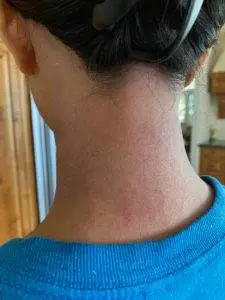
Skin rash with itchy welts or red bumps that seem to appear suddenly, then move to another part of the body, or go away? Hives, also known as urticaria, are caused by a type of allergic reaction that creates a temporary rash or swelling of the skin. TCM and acupuncture have been used for centuries to help relieve hives caused by allergies.
Hives are fairly common, occurring in about 20% of people of all ages. An acute, or short-lived, case of hives may occur because of being exposed to some unusual, new chemical or natural irritant in a person’s environment, maybe in some product, or some pollen or bug. These usually go away quickly, and it may be fairly obvious what it was that caused the outbreak of hives. However, sometimes people develop chronic idiopathic urticaria (CIU), in which a person may break out in hives often on an ongoing basis and have no idea why it keeps happening.
Allergies can manifest in many ways: sometimes causing sneezing, watery eyes, or skin problems. Hives are another way that an allergic reaction can show up. Hives, or urticaria, are distinguishable from other types of skin rash, like dermatitis eczema, or shingles rash, because, unlike other rashes, they do not form fluid-filled bumps or cause dryness, scaliness, or cracking of the skin. Rather, hives are raised welts on the skin that appear red, but then turn white when you press on them; this is known as “blanching.” Hives can look like small, narrow lines, or big, patchy blotches.
Urticaria is related to, and sometimes confused with, angioedema, which is a similar condition, in which deep layers of skin become swollen, often around the eyes and mouth, also due to irritation by some allergen. Angioderma can coexist with hives, and can be more dangerous than hives, if it causes tissues in the throat or tongue to become so swollen that the airway is blocked.
Hives often clear up on their own within a few days or weeks without any treatment. However, some people develop chronic hives, in which the hives rash keeps recurring for weeks or months, or longer. Chronic hives can be a uniquely painful and frustrating condition; never knowing when you might break out into a burning, itchy rash. Hives worse at night or hives worse after sleeping are common experiences for people who suffer from chronic urticaria. Breaking out in hives can make a person feel panic, making it very difficult to get on with daily tasks. Acupuncture treatment can help alleviate the burning and itching of acute hives or chronic hives, and help relieve the allergies, stress, and other underlying conditions that bring them on.

Top 10 Hives Causes or Triggers
In general, what causes hives most of the time is an allergic reaction to some external stimulus. Touching something, eating something, or inhaling something that you are allergic to can cause urticaria to break out on the skin, sometimes briefly, sometimes moving around from one area or the skin to another, or seeming to spread over the skin. Things that can cause hives include:
- Foods, especially those that are well-known allergens like nuts, shellfish, dairy, and eggs, but also fruits, especially citrus fruits
- Contact with certain plants
- Pollen in the environment
- Medications, including antibiotics, OTC pain relievers
- Latex
- Pet dander
- External stimuli from the climate – sun exposure, heat, cold
- Bacterial infections in the body, like strep throat or a UTI
- Viral infections in the body, like colds, hepatitis or mononucleosis (viral hives)
- Blood transfusions
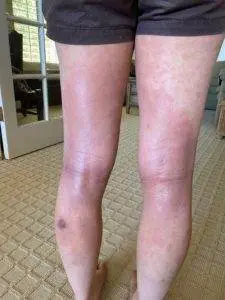
Insect bites or itchy rashes that cause you to scratch at your skin can also cause hives to appear in other areas. Simple pressure on the skin, from sitting or leaning on a patch of skin for a long time, can cause hives. Some people break out in hives when they are under a lot of pressure or emotional stress, even if they are not aware of having allergies or other underlying causes for hives. Sometimes this is called a “stress rash.”
Treatment for Hives
Hives are most commonly treated with antihistamines, which can help relieve itching. Many people experience some type of side effect from taking antihistamines, including: headache, drowsiness, fatigue, and hay fever type symptoms. Some people do get relief from a temporary hives rash after taking Benadryl or something similar. But for others, it may not help, and then doctors often prescribe a corticosteroid as an anti-inflammatory. If steroid treatment for hives does not help, immunosuppressants may be recommended. Depending on the root cause of the hives, these types of pharmacological solutions may or may not work to relieve hives. Acupuncture and TCM treatment focuses on solving the deeper problems that cause hives, without any negative side effects.
How Can Acupuncture Help Hives?

As we have seen, conventional western medicine mostly looks at hives in terms of allergies. But in order to resolve the hives, we have to look more closely at why a person has those allergies. Why are some people affected so strongly by certain foods or certain environmental conditions while other people are not affected at all? We have to consider a person’s constitutional health.
As we have discussed in other articles, in TCM the concept of Wei Qi refers to the body’s protective defenses, the action of which stems mainly from the lungs and the skin. Many types of illness are considered to be related to a weakness or breakdown in the Wei Qi that allows external pathogenic factors to enter the body and take hold. Wind is one such external pathogenic factor. Heat and cold are others. Viral and bacterial infections also find their way into the body when the Wei Qi energy is weakened.
6 Pathogenic Factors According to TCM:
- Wind
- Cold
- Summer Heat
- Dampness
- Dryness
- Fire
Hives come mostly from wind and heat. In TCM, urticaria is known as Feng Zhen Kuai, or “wind rash patch.” Wind describes the nature of urticaria rash in the sense that the hives welts come and go, as if blown about.
When people get hives, it is usually because of one of a few common factors.
- Yin deficiency/Dryness – If the body is too dry, when any allergens get in, there is not enough moisture in the body to wash them out of the system; this causes the breakout.
- Fire/Heat – If there is too much heat, fire, and inflammation in the body, when there is exposure to allergens, the body can’t take any more and will break out.
- Liver stagnation with Heat – When a person is under stress for a long time, it can exacerbate stagnation of Qi in the liver system, which over time causes heat to build up, then the body cannot process little irritations. The liver and kidneys have to do all the work to filter toxins out of the body, but when those organs are overstressed, the body will try to get rid of excess heat through the skin.
Usually, if a person is having chronic hives, it has a lot to do with their food and their habits around their exposure to the elements. For example, in the winter time, in order to be harmonious with the season, the body is meant to experience cold. But many people keep the heater on and keep their environment very warm all the time. This leads to dry air and can cause even people without any allergies to feel itchy. People also tend to take long, hot showers, which can destroy some of the skin’s natural protective layers and cause it to be raw and easily irritated.
In western thought, when a person has a reaction such as hives to certain foods (spicy foods, alcohol), it is thought of as an allergic reaction, but in Chinese medicine we see this as being the body’s reaction to too much heat. If a person already has a fiery constitution, or liver stagnation, and then there are external hot conditions, and hot foods coming in all at once, the internal heat can explode out, creating the burning rash on the skin.
Cupping can be very helpful for treating hives; it exfoliates the skin and helps to draw toxins out. This will help to cool down the hives outbreak. Then we go further with acupuncture and herbs to strengthen the lungs, the liver, and the Wei Qi.
A systematic review of clinical trials studying the use of TCM methods and acupuncture to treat hives, both as an alternative and an adjunct to medication treatment, concluded that acupuncture is a safe and effective way to reduce symptoms of hives or chronic urticaria. Chinese herbs are also well-known for helping to relieve hives.
Top 5 Tips for Hives Relief

How to get rid of hives for good will mean paying attention to what triggers the rash for each individual. To avoid this kind of allergic reaction hives, protect your Wei Qi with healthy habits. Prioritize rest and good nutrition to build up your immunity and protect your lungs and skin.
- Avoid a cold wind blowing on you, whether outside, or from a fan or air conditioner. Dress appropriately; always bring an extra layer so you don’t catch a chill or have a bright sun shining on your skin for a long time when you didn’t expect it.
- Avoid very hot showers, baths, saunas, etc.
- Engage in regular exercise to help boost your blood circulation; walking is always ideal. This will help to reduce stress, as will a meditation practice.
- Get plenty of rest. Good quality sleep is essential to help build up the Wei Qi.
- Avoid foods that are either too hot (spicy or fried, red meats) or too cold (raw foods). No alcohol or coffee. These triggering foods and beverages can really make the hives worse. Drink more water to eliminate the dryness in the body.
If a patient is having trouble figuring out what it is that is causing his or her hives breakouts, a TCM provider may be able to find the underlying reason behind the rash.
Acupuncture Near Me for Hives
People of all ages can receive acupuncture treatment for hives and allergies like hay fever. The doctors at Art of Wellness have been helping people get relief from allergies and itchy skin conditions for over three decades. We can provide help for children with hives with herbs and acupuncture. If you or someone you love is suffering from hives, please consider giving TCM and herbs a try.
*This article is for education from the perspective of Traditional Chinese Medicine only. The education provided by this article is not approved by FDA to diagnose, prevent, treat and cure human diseases. It should not stop you from consulting with your physician for your medical conditions. Traditional Chinese Medicine is based on Qi, which is an invisible force that usually cannot be observed by modern science. Because science focuses on testing ideas about the natural world with evidence obtained through observation, these aspects of acupuncture can’t be studied by science. Therefore acupuncture and Chinese herbs are often not supported by double-blind, randomized trials, and they are considered alternative medicine therapies in the United States.
How to Treat Allergy With Acupuncture and TCM
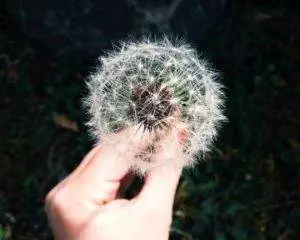
By Xiaomei Cai, L.Ac., Ph.D., & Qineng Tan, L.Ac., Ph.D.
Sinus congestion, runny nose, watery eyes? Itchy skin problem or rashes? It may be seasonal allergies, or an allergic reaction to some specific food or chemical. Acupuncture and TCM herbs can not only help to relieve allergy symptoms, but help to strengthen the body’s immune defenses, so that it is less vulnerable to allergens in the environment.
An allergy is when your immune system produces an antibody response to some substance; it could be a reaction to a plant pollen, an insect venom, a chemical in the air, or some type of food. The body is perceiving the foreign substance as a threat and manufactures antibodies to fight against it. A runny nose (rhinitis), watery eyes, itches in different parts of the head and body, and sneezing are the body’s way of trying to throw off the triggering allergens. Allergies can also cause asthma, which is when the body reacts to triggers with inflammation in the lungs and bronchial tubes, leading to coughing, wheezing, and difficulty breathing.
At least 50 million Americans experience some form of allergy symptoms every year, and the number is growing. The ever-increasing amounts of food additives, chemical pollutants, and other triggers in the environment are causing more and more people of all ages to develop allergies. TCM and Acupuncture have been recognized for a while by the WHO as helpful modalities to relieve respiratory illnesses, including seasonal allergies, rhinitis, sinusitis, and allergy-related asthma.
Top 5 Types of Allergies

Different types of allergies create a variety of symptoms. Seasonal allergies only show up at certain times of the year, when a particular pollen or other natural trigger is abundant, while chronic allergies can flare up at any time.
- Pollen Allergies – these are often referred to as “seasonal allergies,” or “hay fever,” and are triggered by natural pollens given off by trees, weeds, grass, and flowers or mold spores, pet dander. These types of allergy cause sneezing and runny nose (rhinitis) and eye allergies, or itchy, watering eyes.
- Insect Allergies – these can refer to the types of acute allergic reactions people have to bug bites (mosquito bites or spider bites) or stings from bees or wasps. It can also refer to respiratory or skin reactions to exposure to dust mites or cockroaches in the home environment.
- Skin Allergies – these include acute skin allergies like the hives or rashes caused by poison ivy or poison oak. They also include skin reactions to latex. Eczema is a more chronic skin allergy condition, where inflammation causes itchy patches of skin that can become very dry and scaly. Dermatitis or eczema often start in childhood. Flare-ups can happen due to external irritants, like certain soaps or detergents, fabrics, ingredients in topical ointments or lotions, or smoke in the air. Stress is also a contributing factor to eczema.
- Food Allergies – food allergies are especially common in children, with over 5% of children in the U.S. diagnosed in recent years. Certain types of nuts, dairy, soy, wheat, and shellfish are the most common food allergens. In some cases, food allergies are so severe that exposure can lead to a life-threatening reaction of anaphylaxis, an emergency situation in which blood pressure can slow down dramatically, and a person may have severe difficulty breathing. Every year, 200,000 people seek emergency medical care for a severe food allergy reaction.
- Drug Allergy – many people have allergic reactions to certain types of medication, including antibiotics, anti-inflammatories, ACE inhibitors, anti-seizure medications, and even aspirin. The most common symptoms of an allergic reaction to medication are: hives or rash, fever, stomach upset, or asthma-like wheezing. A severe drug allergy can also cause anaphylaxis.
Allergy treatment first involves finding out exactly what allergens will potentially cause a reaction. Allergy testing helps determine what, specifically, is triggering the symptoms. Then, a person is encouraged to avoid this trigger as best they can. Many people try over the counter antihistamines, decongestants, and nasal sprays to help manage their allergy symptoms. For more severe allergies, doctors may prescribe corticosteroids in spray, pill, or ointment formulations. Epinephrine injections are necessary to stop severe reactions and prevent anaphylactic shock.
Immunotherapy is an option for some people with a chronic allergic condition. A small amount of the allergen is introduced into the body either via injection (allergy shots) or in a sublingual (under the tongue) form. These can help people build us a better resistance to the allergy trigger over time.
How Can Acupuncture Help Seasonal Allergies?
Modern medical science has made many recent advances in understanding of the human body’s immune system. It is highly complex, and there is still much to learn. In TCM, we have for many centuries been aware of and observed what we call “Wei Qi,” which essentially means protective energy.

TCM always acknowledges dualities and the relationship between opposing and coordinating forces. In every case, we look for internal factors and external factors that are affecting the health of the person. In TCM, the immune system has both internal and external components. The external Wei Qi is a protective force that functions as a shield, blocking external pathogens like wind, dampness, and cold, from entering into the body. The lungs provide the energy to keep Wei Qi strong and especially to keep pathogens from entering through the nose and mouth. However, when Wei Qi is weak, it becomes easy for Wind to enter the head and bring with it other external pathogens, like cold, heat, dampness, or dryness.
According to TCM, a person who suffers from allergies generally has a deficiency of Wei Qi, making them more susceptible to invasions of Wind. Acupuncture treatment might focus, for example, on strengthening the lungs and spleen, which helps to build the Wei Qi back up. Herbal remedies can both relieve hay fever symptoms and rhinitis, and help to tonify the Wei Qi, so that allergic reactions will lessen over time.
One trial found that people were able to reduce their use of allergy medication after an eight-week course of acupuncture treatment for allergies. Another research study found that patients in a control group who received acupuncture reported better control of allergy symptoms during pollen season, with less reliance on antihistamines.
TCM and Acupuncture for Food Allergy
Recent research supports the efficacy of TCM herbs for helping to prevent severe reactions in people who suffer from food allergies. A specific formulation of eight Chinese herbs has been shown to be helpful for reducing the incidence of anaphylaxis in people with various types of food allergies, including milk, dairy, peanuts, tree nuts, and fruits. Herbal creams and herb bath preparations can also help prevent severe reactions, when used consistently for a course of treatment.
An acupuncture practitioner will also use their wide knowledge of nutrition to help patients with Celiac disease, food sensitivities and food intolerance manage their diet. Often, when dealing with allergies and sensitivities, it can be challenging to find what needs to be eliminated, as it is not always immediately obvious to a person which foods or other environmental factors are involved in creating the uncomfortable symptoms. Sometimes a chronic allergy is a sign of a candida infection. A TCM doctor will spend time looking carefully at all of the lifestyle behaviors involved and make appropriate recommendations to help remove hidden triggers.
Top 3 Tips to Help Allergies Naturally
Getting regular acupuncture “tune-ups” is one great, natural way to help relieve allergies. Here are some other ideas you can put into practice to help rid your home and work environment of potential allergens.
- Air Filter – a good-quality HEPA filter will remove particles of pollen, dust, and pet dander from the ambient air. This works best if you also make sure to keep the windows and doors closed when you suspect pollen is heavy in the air outside.
- Probiotics – a recent systematic review showed that taking probiotics can help reduce symptoms of allergic rhinitis. Probiotics help balance gut flora, which we now know is vital to proper immune functioning and prevention of inflammation.
- Wash Your Hands – Manage allergens that come home with you by washing your hands and putting your clothes in the laundry as soon as you get home.
Acupuncture Near Me for Allergy Relief
Seasonal allergies, food allergies, and allergies to chemicals and medication are all on the rise. While people are able to get some relief from conventional medications, TCM treatment offers a viable alternative without the possible side effects of these medicines. Acupuncture can help reduce the need for emergency treatment for severe allergic reactions, and also help prevent hay fever from recurring, year after year. Partner with an acupuncturist near me for allergy treatment now to ensure that when allergy season rolls around again, you are prepared with a strong defense.
*This article is for education from the perspective of Traditional Chinese Medicine only. The education provided by this article is not approved by FDA to diagnose, prevent, treat and cure human diseases. It should not stop you from consulting with your physician for your medical conditions. Traditional Chinese Medicine is based on Qi, which is an invisible force that usually cannot be observed by modern science. Because science focuses on testing ideas about the natural world with evidence obtained through observation, these aspects of acupuncture can’t be studied by science. Therefore acupuncture and Chinese herbs are often not supported by double-blind, randomized trials, and they are considered alternative medicine therapies in the United States.
How to Treat Asthma With Acupuncture and TCM
By Qineng Tan, L.Ac., Ph.D. & Xiaomei Cai, L.Ac., Ph.D.

Difficulty breathing? Could it be seasonal allergies, or could I have asthma? Asthma symptoms include shortness of breath, wheezing, and an allergy cough that is usually more pronounced in the morning and evening. Acupuncture and TCM have long been recognized as offering effective treatment for allergic rhinitis (hay fever) related to asthma.
Asthma, a chronic lung condition which creates inflammation of the airways of the respiratory system, often begins causing breathing problems in childhood. In fact, asthma is the most common chronic disease affecting children worldwide. Sometimes asthma symptoms go away as a child grows up, but asthma can affect both children and adults long-term.
What is an asthma attack? An asthma attack occurs when the bronchial tubes become constricted. The tightening of muscles around the bronchi, combined with inflammation on the inner walls of these airways, causes shortness of breath, chest pain, coughing, and wheezing. Asthma attacks can be profoundly frightening; sometimes people describe the experience as feeling like they’re drowning.
Allergy triggers like dust mites and ragweed often cause asthma symptoms to flare up. Asthma attacks are often triggered by the same sorts of things that cause other types of allergic reactions: high pollen counts, pet dander, chemical perfumes, or smoke. An asthma attack can also be caused by changes in temperature, strong aerobic exercise, or a bout of intense crying or laughing. A viral respiratory infection can also trigger asthma.
Asthma attacks due to seasonal allergies are often managed by conventional medicine with inhalers, corticosteroids like methylprednisolone, or antihistamines like Zyrtecs. Usually doctors will prescribe a medication intended for long-term management of symptoms, and a “rescue inhaler” designed to stop an asthma attack in progress. Allergy medications can help relieve hay fever symptoms like itchy eyes and sneezing and help prevent a full-blown asthma attack, but they do not address the immune system imbalances that are the root cause of asthma and allergies. Acupuncture treatment used in addition to standard medical remedies for asthma has been clinically shown to help reduce symptoms and improve overall quality of life. Along with helping people maintain their normal activities and sleep better, TCM methods used in conjunction with conventional medical therapy can reduce the need for trips to the emergency room or hospital for asthma attacks.
Can asthma be cured? Asthma may never go away completely, but it can be managed so effectively that it no longer has a negative impact on your life.
Top 5 Asthma Symptoms
Asthma symptoms often begin appearing during childhood, but asthma can come on at any age. When a person develops asthma later in life, it is called “adult onset asthma.” Sometimes people don’t realize they have asthma because they aren’t experiencing what they think of as the classic “asthma attack.” A persistent cough, especially one that gets worse at night, is actually one of the most pervasive symptoms of asthma. Other symptoms of asthma include:
- Coughing frequently, allergy cough
- Wheezing (that whistling sound when you breathe)
- Shortness of breath (having trouble drawing a full breath)
- Rapid breathing
- Chest tightness, breathing chest pain
Why is asthma worse at night? The precise reason for the increase of asthma symptoms during the night, known as “nocturnal asthma,” has not been medically proven, but it is probably due to a combination of factors:
- Cooler air entering the bronchial passages
- Increase of allergens like pollen in the air
- Exposure to dust mites or pet dander in the bed
- Reclining sleep position makes it harder to breathe
- Hormone secretions that occur during sleep
Nighttime asthma can really affect your ability to get enough quality sleep.
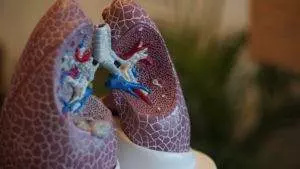
Many of the symptoms of asthma are similar to those of an allergic reaction. However, seasonal allergies usually also cause symptoms like: head congestion, runny nose, itching inside the mouth, throat, and ears, sinus pain, and postnasal drip. Asthma doesn’t cause these sorts of upper respiratory symptoms because it is a condition of the lungs and bronchial tubes.
In order to make a definitive diagnosis of asthma, a doctor will usually perform tests that determine your lung function. A spirometer is a tool that helps determine how much air you are able to inhale and exhale. If you are able to inhale better after being given medication from an inhaler, then it will be concluded that you probably have asthma. An x-ray can show whether the bronchial tubes are blocked and determine whether there might be some other cause for lung damage, such as pneumonia or tuberculosis. Often people will also be given allergy testing to determine what triggers may affect their breathing.
Can Acupuncture Help Asthma?
Asthma has been recognized by TCM since ancient times. We call asthma “Xiao Chuan,” which means “wheezing, breathlessness.” According to TCM theory, the lungs control inhaling, while the kidneys control exhaling. Lung Qi (energy) should move downward, while Liver Qi should move upward, and these energies work in harmony. Asthma is the result of one or all of these energies entering into a state of imbalance or deficiency. Excess wind and/or phlegm get trapped in the lungs and airways, creating obstructions and producing the wheezing and shortness of breath associated with asthma. Acupuncture treatment focuses largely on strengthening the kidneys and lungs, and clearing phlegm and wind from the system.
One study determined that acupuncture treatment reduced “respiratory resistance,” helping to open up the bronchial tubes. A study in Denmark focused specifically on young children with asthma showed that symptoms and need for medications was reduced significantly after ten acupuncture treatments. A systematic review of nine studies involving patients using TCM as a complementary therapy in addition to conventional treatment showed an overall improvement in asthma symptoms and concluded that acupuncture should be considered as an adjunct to medications.

As always, herbal supplementation is also a crucial component of TCM treatment for asthma and allergies. Research has shown that classic TCM herbal formulations for asthma provide many therapeutic benefits, including: reducing hyperreactivity in the bronchial tubes, reducing inflammation of the lungs and tubes, and calming muscle contractions around the airways. One study specifically focused on children with asthma concluded that patients who were given a specific TCM herb combination showed significant improvement over a 12-week period when compared to a control group of children who received a placebo instead.
Asthma attacks are genuinely frightening, and when severe, can even be life-threatening. It is important that people with asthma have emergency inhalant medications to help them in the event of a serious asthma attack. However, the regular use of steroid medications comes with other risks. Corticosteroids can suppress normal immune function, affect the adrenal hormones, and actually increase inflammation. These unwanted side effects may be especially concerning for young children with asthma. Chinese herbs offer a safe alternative to steroids, having been used for thousands of years with no negative side effects.
Top 5 Tips to Help Control Asthma
It’s important to seek health care for managing asthma, but there are home remedies for shortness of breath and natural remedies for wheezing that may help you take control of asthma attacks and help you sleep better without an asthma coughing attack in the night.
- Don’t smoke, and avoid other people who do. Stay out of places where there is second-hand cigarette smoke or other ambient smoke or chemical perfumes.
- Use a high quality air filter in your home. Keep dust and mold under control. Remove old carpets and any other fabrics that might have dust mites in them.
- Manage stress. Stress and anxiety can be triggers for asthma attacks. Regular acupuncture treatment will help, as will consistent practice of meditation and breathing exercises.
- Avoid dairy products. Milk and other dairy foods are notorious for creating congestion and irritating the airways.
- Drink warm, soothing liquids throughout the day. Tea and warm honey-lemon water keep the airways moist and open, while providing immune-boosting properties.
Acupuncture Near Me for Asthma
The benefits of acupuncture treatment are cumulative. Building a strong and consistent partnership with a TCM provider can help you to manage asthma and allergy symptoms, boost your overall immunity, and prevent other health problems from developing. If you or someone you know has breathing problems, allergies, or food sensitivities, call Art of Wellness today to get started with a wellness regimen that will have you breathing easier.
*This article is for education from the perspective of Traditional Chinese Medicine only. The education provided by this article is not approved by FDA to diagnose, prevent, treat and cure human diseases. It should not stop you from consulting with your physician for your medical conditions. Traditional Chinese Medicine is based on Qi, which is an invisible force that usually cannot be observed by modern science. Because science focuses on testing ideas about the natural world with evidence obtained through observation, these aspects of acupuncture can’t be studied by science. Therefore acupuncture and Chinese herbs are often not supported by double-blind, randomized trials, and they are considered alternative medicine therapies in the United States.
Go Beyond Skin Deep with TCM
by Xiaomei Cai, L.Ac., Ph.D.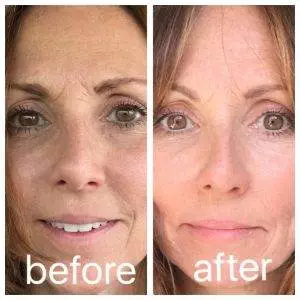
“The qi of the five zang organs manifests in the face. . .if we see green like jade, red like the crown of a rooster, yellow like the underside of a crab, white like the lard of a pig, or black like the feathers of a black chicken, these are the colors of life.”
– The Yellow Emperor’s Classic of Medicine
A practitioner of Traditional Chinese Medicine can tell a lot about your health from your face and your skin. In TCM, each of the organ systems corresponds to one of the sense organs; so the appearance and function of the eyes, nose, mouth, ears, and eyes can give the doctor information about what might be going on in the liver, heart, intestines, and other major organs. Conversely, problems in the liver, etc., will show on your face. The skin is considered the “opening” of the lungs; this is why problems with environmental toxins often display themselves through skin conditions such as eczema, rashes, psoriasis, hair loss, acne, dullness or roughness.
In other words, we know that health, and beauty, are not only “skin-deep.” The skin’s surface and the life of the facial features give us clues as to what is going on underneath. The skin reflects imbalances of the internal landscape of the body. Stress and strong emotions, hormone imbalances, inappropriate dietary habits and environmental influences all will be represented on the skin, our largest organ. We must treat the underlying conditions deep within the body first, then we will see the skin bloom with health. Any skin condition is like a red flag showing that there are some impurities or toxins building up inside. Normally, our bodies can self-clean; our liver and kidney filter all impurities out. But if there are too many toxins, or the body is under a lot of stress –eg., not enough sleep, or lacking in regular “tune-ups,” just as a car needs maintenance at regular intervals–, then the problems build up and break outs occur.
For example, conditions such as scaling psoriasis and rosacea are often caused by excess internal heat, especially that which we call Stomach Fire, so our acupuncture and herbal treatments will be designed to clear the heat, along with dietary changes, such as avoidance of alcohol, coffee, sugar, and red meat (all of which we recommend avoiding, anyway). Western medicine will often treat these conditions with cortisone, which may suppress the some of the symptoms for the duration of use, but it will not address the root cause. Long-term use of cortisone can have very detrimental effects on your overall health.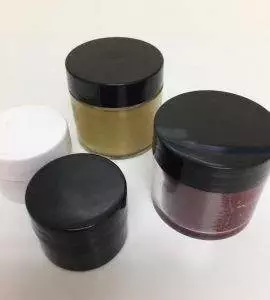
Hives – itchy, red patches that come and go – are considered by Western medicine to be caused by histamine reactions, and are almost always treated with antihistamines. In TCM, they are considered a “wind rash;” like wind, they can be cold or hot, and can move from one place to another quickly. This signals a weakness in the exterior immune barrier that your skin provides, and that you are extra susceptible to stress and/or allergens in your environment. Balancing the excess heat or cold in the body with acupuncture treatment, discovering where the irritants are coming from and altering your diet, hygiene regimens, etc. can alleviate the hives, and also strengthen your overall immunity.
Eczema, or dermatitis, can show up in many forms, but they are all due to imbalances in the body caused by toxic buildup from both external and internal sources. Again, stress and hormones play a role, as do the plethora of artificial toxins in our environment. The body’s own immune response to this constant bombardment of toxins can cause skin irritations. Our strategy might include building up deficient blood with more nutrients, clearing dampness, and prescribing cleansing herbs and foods.
Acne – pimples or lesions that break out on the skin’s surface – is not a superficial problem. It is always related to things that are going on internally, often with the digestive system. Improper diet or imbalances in hormones lead to inflammation that is “overflowing,” and, having nowhere else to go, erupts out of the body through the skin. Making appropriate modifications to your food program and balancing hormones will clear the acne for good, where topical solutions and birth control pills provide only temporary improvement.
If aging is your concern, we are able to choose specific points for an acupuncture facial, which tightens and tones the skin and boosts the production of collagen. This treatment will help smooth fine wrinkles, improve circulation, and hasten healing of any acne, rosacea, and other skin irritations. Acupuncture also releases endorphins, which make you feel more relaxed and positive. Most people find acupuncture treatment painless and relaxing. You can see a difference after just one or two treatments, but the benefits keep growing, as the results are cumulative.
Why choose acupuncture over modern dermatological procedures? If you are looking for treatment that is natural,with natural-looking results and no or minimal negative side effects, it is worth a try. If you come with a skin condition, we will conduct a full consultation to determine which organ system has an imbalance and offer acupuncture treatment to improve Qi flow, cupping to get rid of deep tissue toxins and activate the lymphatic system to clean the internal organs, herbal therapy to clear heat, and dietary suggestions to prevent the skin condition from coming back.